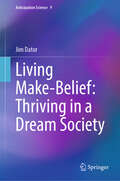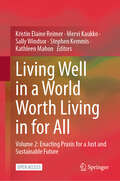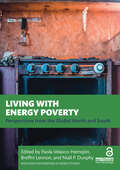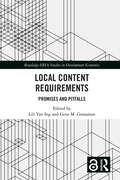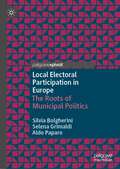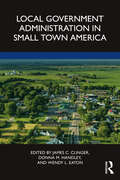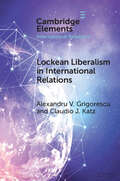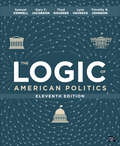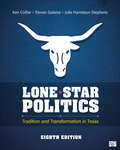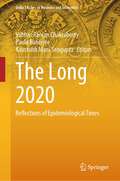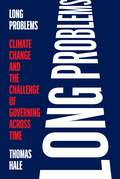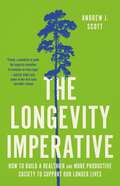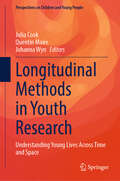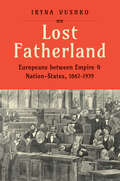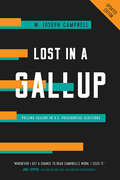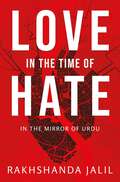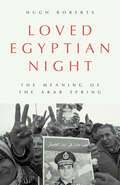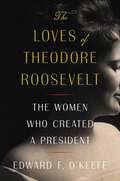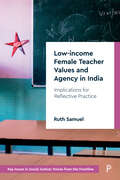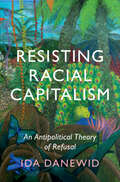- Table View
- List View
Living Make-Belief: Thriving in a Dream Society (Anticipation Science #9)
by Jim DatorThis book shows how multiple developments have caused the world to move from “an information society” to a “dream society”. Ongoing social and technological forces are pushing us from a world of words, rationality, and truth into a world of images, performance, and make-belief. Rather than deny or reject this transformation, this book argues that one should understand and embrace it as waves of new futures that the world must strive to surf for fame and fun. As a political scientist and futurist, the author also offers hints of new goals and forms of governance fit for a dream society, as he demonstrates that all current systems are ineffective and dangerously obsolete. This book is of great interest to political philosophers, futures scientists, sociologists, and those interested in cultural studies.
Living Well in a World Worth Living in for All: Volume 2: Enacting Praxis for a Just and Sustainable Future
by Stephen Kemmis Kathleen Mahon Mervi Kaukko Kristin Elaine Reimer Sally WindsorThis open access book is the second of a two-volume series that explores how people are living well and creating a “World Worth Living in for All”. It engages in deep listening of voices from across the world and considers the role of education in creating a more just and sustainable world for the future. The book asks what can be learnt to create change in policy and practice in order to enact praxis. It showcases chapters from international authors who discuss current or new projects to address the overarching questions explored in the book. It also provides an overview of perspectives that connect both volumes and the individual projects presented together through the lens of practice architectures.
Living with Energy Poverty: Perspectives from the Global North and South (Routledge Explorations in Energy Studies)
by Paola Velasco-Herrejón Breffní Lennon Niall P. DunphyLiving with Energy Poverty: Perspectives from the Global North and South expands our collective understanding of energy poverty and deepens our recognition of the phenomenon by engaging with the lived experiences of energy-poor households across different contexts. Understanding the lived experience of energy poverty is an essential component in the design of any effort to alleviate what is fundamentally a deep-rooted, multi-faceted, wickedly complex problem. This requires a nuanced understanding of the causal factors and the research methods that can respond to the flexible spatial and temporal nature of the condition, as well as its wellbeing and justice implications. Drawing together the expertise and connectedness of authors from the Global South and North, this book presents novel approaches to understanding the often hidden forms of domestic energy deprivation. Case studies from 20 countries provide critical perspectives on this phenomenon while analysing the policy practices, government strategy, and sustainability implications of divergent manifestations. The book takes a multidimensional perspective, challenging the bias towards energy production and service provision, which often do not align with the aspirations and realities of energy households across global contexts, thus facilitating a useful dialogue on the nature of energy poverty. The book is a timely source for policymakers, practitioners, and scholars seeking fresh, diverse insights into the everyday reality of energy poverty and wanting to better understand the challenges a people-centred, just energy transition can present.
Living with Energy Poverty: Perspectives from the Global North and South (Routledge Explorations in Energy Studies)
by Paola Velasco-Herrejón Breffní Lennon Niall P. DunphyLiving with Energy Poverty: Perspectives from the Global North and South expands our collective understanding of energy poverty and deepens our recognition of the phenomenon by engaging with the lived experiences of energy-poor households across different contexts.Understanding the lived experience of energy poverty is an essential component in the design of any effort to alleviate what is fundamentally a deep-rooted, multi-faceted, wickedly complex problem. This requires a nuanced understanding of the causal factors and the research methods that can respond to the flexible spatial and temporal nature of the condition, as well as its wellbeing and justice implications. Drawing together the expertise and connectedness of authors from the Global South and North, this book presents novel approaches to understanding the often hidden forms of domestic energy deprivation. Case studies from 20 countries provide critical perspectives on this phenomenon while analysing the policy practices, government strategy, and sustainability implications of divergent manifestations. The book takes a multidimensional perspective, challenging the bias towards energy production and service provision, which often do not align with the aspirations and realities of energy households across global contexts, thus facilitating a useful dialogue on the nature of energy poverty.The book is a timely source for policymakers, practitioners, and scholars seeking fresh, diverse insights into the everyday reality of energy poverty and wanting to better understand the challenges a people-centred, just energy transition can present.Chapter 1 of this book is freely available as a downloadable Open Access PDF at http://www.taylorfrancis.com under a Creative Commons [Attribution-Non Commercial-No Derivatives (CC-BY-NC-ND)] 4.0 license.Chapter 2 of this book is freely available as a downloadable Open Access PDF at http://www.taylorfrancis.com under a Creative Commons [Attribution-Non Commercial-No Derivatives (CC-BY-NC-ND)] 4.0 license.Chapter 22 of this book is freely available as a downloadable Open Access PDF at http://www.taylorfrancis.com under a Creative Commons [Attribution-Non Commercial-No Derivatives (CC-BY-NC-ND)] 4.0 license.
Lobbying for Zionism on Both Sides of the Atlantic
by Ilan PappeIn 1896, a Jewish state was a pipe dream. Today the overwhelming majority of Jews identify as Zionists. How did this happen? Ilan Pappe unveils how over a century of aggressive lobbying changed the map of the Middle East. Pro-Israel lobbies convinced British and American policymakers to condone Israel&’s flagrant breaches of international law, grant Israel unprecedented military aid and deny Palestinians rights. Anyone who questioned unconditional support for Israel, even in the mildest terms, became the target of relentless smear campaigns. Lobbying for Zionism on Both Sides of the Atlantic shows us how an unassailable consensus was built – and how it might be dismantled.
Local Content Requirements: Promises and Pitfalls (Routledge-ERIA Studies in Development Economics)
by Gene M. Grossman Lili Yan IngAs anti-globalization and geopolitical tensions continue to rise, the use of local content requirements (LCRs) around the world has become more noticeable than ever before. The reasons for adopting LCRs range from ensuring domestic supply availability, job creation, and increasing value added to safeguarding national security. Ing and Grossman examine country-specific as well as firm-product level exercises to explain how LCRs reduce fair competition, resulting in lower trade and productivity, which ultimately lowers world economic output and overall human welfare. Countries around the world are investigated with specific attention to the US, China, Indonesia, and resource-intensive countries, including mining-intensive ones. The book also presents product- and firm-level analyses, answering the question of why countries adopted LCRs and how LCRs actually affect the world economy. This book is a useful resource that will interest policymakers, researchers, and advanced undergraduates interested in international trade, industrial policy, political economy, labour economics, and development economics.
Local Electoral Participation in Europe: The Roots of Municipal Politics
by Silvia Bolgherini Selena Grimaldi Aldo PaparoWhile electoral participation is a traditional topic in political science, voter turnout at the local level is still largely uncharted. There are very few large-N comparative works on municipal turnout and, as a result, a lack of a comprehensive comparative picture of local electoral participation. This book aims to fill that gap by taking an innovative approach to the topic. The volume makes three major advances at the empirical, methodological and theoretical levels. Empirically, it provides a large-N comparison by covering 18 European countries and more than 70,000 municipalities. Methodologically, the book uses the multi-level congruence theory to study municipal turnout in relation to national turnout, exploring the variation between those levels. Theoretically, it bridges the two main (and often mutually exclusive) strands in the literature on local elections – the lower-rank and different-kind approaches – and it assesses the features and mechanisms of local voting.
Local Government Administration in Small Town America
by James C. Clinger Donna M. Handley Wendy L. EatonIn government administration and leadership, rural community leaders face unique challenges in delivering public services including (but not limited to) education, health care, and public safety. Meanwhile, residents who live in smaller and more isolated rural settings often face greater difficulties accessing provisions and services or commuting to work, among other economic development challenges. These factors may affect a community’s resiliency to and recovery from shocks such as the COVID-19 pandemic. Local Government Administration in Small Town America devotes some overdue scholarly attention to the governance and administration of public programs in small towns and rural communities in the United States.The chapter contributors to this volume analyze some of the unique challenges rural communities face, as well as the policy tools that their governments employ to address them. The book explores ways that small town governments collaborate with one another, the state, and the federal government, and examines how local government officials use knowledge of people and place to improve policy performance. The chapters are designed to provide cases and strategies for students and practitioners in public administration to use in a small town environment, while also considering a community’s distinctive social and political culture, which determines how local political leaders and government practitioners might respond to demands and challenges they face. Local Government Administration in Small Town America is an essential resource for undergraduate and graduate students studying local government, as well as for rural practitioners navigating evolving challenges unique to their communities.
Lockean Liberalism in International Relations (Elements in International Relations)
by null Alexandru V. Grigorescu null Claudio J. KatzThis Element applies a new version of liberalism to international relations (IR), one that derives from the political theory of John Locke. It begins with a survey of liberal IR theories, showing that the main variants of this approach have all glossed over classical liberalism's core concern: fear of the state's concentrated power and the imperative of establishing institutions to restrain its inevitable abuse. The authors tease out from Locke's work its 'realist' elements: his emphasis on politics, power, and restraints on power (the 'Lockean tripod'). They then show how this Lockean approach (1) complements existing liberal approaches and answers some of the existing critiques directed toward them, (2) offers a broader analytical framework for several very different strands of IR literature, and (3) has broad theoretical and practical implications for international relations.
The Logic of American Politics
by Gary C. Jacobson Timothy R. Johnson Lynn Vavreck Thad Kousser Samuel H. KernellWhy does the American political system work the way it does? After observing the strains of intense partisanship and divided government, many Americans are wondering what logic, if any, can be found in politics. With both sides of the political spectrum being so different from one another and the scales often tipping in the favor of the opposing party by a fraction of a percentage point, how can anyone work the system to their advantage? With fresh analysis of the 2022 midterm election results, the Eleventh Edition of bestselling textbook The Logic of American Politics provides students with the tools they need to make sense of our government today. Weaving together historical context, contemporary politics, and a "toolkit" of institutional design concepts, the authors build an understanding of political institutions and practices as imperfect solutions to collective action problems. This title is accompanied by a complete teaching and learning package. Contact your SAGE representative to request a demo. Learning Platform / Courseware SAGE Vantage is an intuitive learning platform that integrates quality SAGE textbook content with assignable multimedia activities and auto-graded assessments to drive student engagement and ensure accountability. Unparalleled in its ease of use and built for dynamic teaching and learning, Vantage offers customizable LMS integration and best-in-class support. It’s a learning platform you, and your students, will actually love. Learn more. Assignable Video with Assessment Assignable video (available in SAGE Vantage) is tied to learning objectives and curated exclusively for this text to bring concepts to life. Watch a sample video now. LMS Cartridge: Import this title’s instructor resources into your school’s learning management system (LMS) and save time. Don’t use an LMS? You can still access all of the same online resources for this title via the password-protected Instructor Resource Site. Learn more.
The Logic of American Politics
by Samuel H. Kernell Gary C. Jacobson Thad Kousser Lynn Vavreck Timothy R. JohnsonWhy does the American political system work the way it does? After observing the strains of intense partisanship and divided government, many Americans are wondering what logic, if any, can be found in politics. With both sides of the political spectrum being so different from one another and the scales often tipping in the favor of the opposing party by a fraction of a percentage point, how can anyone work the system to their advantage? With fresh analysis of the 2022 midterm election results, the Eleventh Edition of bestselling textbook The Logic of American Politics provides students with the tools they need to make sense of our government today. Weaving together historical context, contemporary politics, and a "toolkit" of institutional design concepts, the authors build an understanding of political institutions and practices as imperfect solutions to collective action problems. This title is accompanied by a complete teaching and learning package. Contact your SAGE representative to request a demo. Learning Platform / Courseware SAGE Vantage is an intuitive learning platform that integrates quality SAGE textbook content with assignable multimedia activities and auto-graded assessments to drive student engagement and ensure accountability. Unparalleled in its ease of use and built for dynamic teaching and learning, Vantage offers customizable LMS integration and best-in-class support. It’s a learning platform you, and your students, will actually love. Learn more. Assignable Video with Assessment Assignable video (available in SAGE Vantage) is tied to learning objectives and curated exclusively for this text to bring concepts to life. Watch a sample video now. LMS Cartridge: Import this title’s instructor resources into your school’s learning management system (LMS) and save time. Don’t use an LMS? You can still access all of the same online resources for this title via the password-protected Instructor Resource Site. Learn more.
Lone Star Politics: Tradition and Transformation in Texas
by Ken Collier Steven E. Galatas Julie D. Harrelson-StephensIn Texas, myth often clashes with the reality of everyday government. Explore the state’s rich political tradition with the Eighth Edition of Lone Star Politics. Utilizing a comparative approach, the authors set Texas in context with other states′ constitutions, policymaking, electoral practices, and institutions as they delve into the evolution of its politics. Critical thinking questions and unvarnished Winners and Losers discussions guide students toward understanding Texas government and assessing the state′s political landscape. The Eighth Edition includes a brand-new chapter on Civil Rights and Civil Liberties, along with the "tried and true" updates in every chapter that highlight the push-pull relationship between the state, federal, and local governments.
Lone Star Politics: Tradition and Transformation in Texas
by Ken Collier Steven E. Galatas Julie D. Harrelson-StephensIn Texas, myth often clashes with the reality of everyday government. Explore the state’s rich political tradition with the Eighth Edition of Lone Star Politics. Utilizing a comparative approach, the authors set Texas in context with other states′ constitutions, policymaking, electoral practices, and institutions as they delve into the evolution of its politics. Critical thinking questions and unvarnished Winners and Losers discussions guide students toward understanding Texas government and assessing the state′s political landscape. The Eighth Edition includes a brand-new chapter on Civil Rights and Civil Liberties, along with the "tried and true" updates in every chapter that highlight the push-pull relationship between the state, federal, and local governments.
The Long 2020: Reflections of Epidemiological Times (India Studies in Business and Economics)
by Subhas Ranjan Chakraborty Paula Banerjee Kaustubh Mani SenguptaThis book looks at the current crises of life and livelihood following the global epidemiological crisis and various strategies to manage them as a long unfolding of past trends and future possibilities of epidemiological governance, restructuring of global economy, public health, systems of protection and care and the role of state in that, and precarities of the migrants and the refugees. It brings together scholars from different fields to think of our present in the time of COVID-19 pandemic in a longer temporal frame. The essays compiled in this book investigate issues mentioned above, covering a period from the colonial past to the postcolonial present with an aim towards encouraging scholarly debates on protection, care and justice. Although the experiences of last two years have inspired some very important academic and scholarly interventions, this book compiles original research to contextualise the present in a longue duree framework and arrive at a more complex understanding of it. It is a must-have resource for researchers of developmental studies especially in the above mentioned areas, as well as policy makers, think tanks and other non-governmental organizations interested in these areas.
Long Haul: Hunting the Highway Serial Killers
by Frank Figliuzzi"A true-crime masterpiece." —Don WinslowFrom the FBI’s former assistant director, a shocking journey to the dark side of America’s highways, revealing the FBI Highway Serial Killings Initiative’s hunt for the long-haul truckers behind an astonishing 850 murders–and counting.In 2004, the FBI was tipped off to a gruesome pattern of unsolved murders along American roadways. Today at least 850 homicides have been linked to a solitary breed of predators: long-haul truck drivers. They have been given names like the “Truck Stop Killer,” who rigged a traveling torture chamber in the rear of his truck and is suspected to have killed fifty women, and “The Interstate Strangler,” who once answered a phone call from his mother while killing one of his dozen victims. The crisis was such that the FBI opened a special unit, the Highway Serial Killings Initiative. In many cases, the victims—often at-risk women—are picked up at truck stops in one jurisdiction, sexually assaulted and murdered in another, and dumped along a highway in a third place. The transient nature of the offenders and multiple jurisdictions involved make these cases incredibly difficult to solve.Based on his own on-the-ground research and drawing on his twenty-five-year career as an FBI special agent, Frank Figliuzzi investigates the most terrifying cases. He also rides in a big-rig with a long-haul trucker for thousands of miles, gaining an intimate understanding of the life and habits of drivers and their roadside culture. And he interviews the courageous trafficked victims of these crimes, and their inspiring efforts to now help others avoid similar fates.Long Haul is a gripping exploration of a violent, disordered world hiding in plain sight, and the heroes racing to end the horror. It will forever unsettle how you travel on the road.
Long Problems: Climate Change and the Challenge of Governing across Time
by Thomas HalePolitical strategies for tackling climate change and other &“long problems&” that span generationsClimate change and its consequences unfold over many generations. Past emissions affect our climate today, just as our actions shape the climate of tomorrow, while the effects of global warming will last thousands of years. Yet the priorities of the present dominate our climate policy and the politics surrounding it. Even the social science that attempts to frame the problem does not theorize time effectively. In this pathbreaking book, Thomas Hale examines the politics of climate change and other &“long problems.&” He shows why we find it hard to act before a problem&’s effects are felt, why our future interests carry little weight in current debates, and why our institutions struggle to balance durability and adaptability. With long-term goals in mind, he outlines strategies for tilting the politics and policies of climate change toward better outcomes.Globalization &“widened&” political problems across national boundaries and changed our understanding of politics and governance. Hale argues that we must make a similar shift to understand the &“lengthening&” of problems across time. He describes tools and strategies that can, under certain conditions, allow policymakers to anticipate future needs and risks, make interventions that get ahead of problems, shift time horizons, adapt to changing circumstances, and set forward-looking goals that endure. As the climate changes, politics must, too. Efforts to solve long-term problems—not only climate change but other issues as well, including technology governance and demographic shifts—can also be a catalyst for a broader institutional transformation oriented toward the long term. With Long Problems, Hale offers an essential guide to governing across time.
The Longevity Imperative: How to Build a Healthier and More Productive Society to Support Our Longer Lives
by Andrew J. Scott&“A manifesto to guide the longevity revolution&” (David Sinclair) for individuals, institutions, and society to adapt to the reality of living longer lives Thanks to increases in life expectancy, we can now expect to live for a long time. Most of us would welcome an extra day in the week, so why do so many of us view the prospect of additional years with fear and skepticism? The reason is simple: society is not currently structured to support long lives. Rather than thinking in terms of the needs of a rising number of older people, we must instead support the young and middle-aged to prepare differently for the longer futures they can expect. The Longevity Imperative outlines the innovations needed to make the most of these longer lives: substantial changes to our health system, economy, and financial sector, as well as in how we manage our careers, health, finances, and relationships. Instead of seeing longevity as a problem, economist Andrew J. Scott challenges us to view it as an opportunity. This book charts a course to address the individual, social, political, economic, and cultural changes required so that all of us—regardless of age—can live lives that are not just longer but healthier, happier, and more productive.
Longitudinal Methods in Youth Research: Understanding Young Lives Across Time and Space (Perspectives on Children and Young People #15)
by Johanna Wyn Julia Cook Quentin MaireThis book addresses how longitudinal research approaches are used to understand young people’s lives. It elucidates how youth researchers use longitudinal approaches, and how longitudinal research can help us to both understand and shape the field of youth sociology. Chapters discuss the creation of knowledge about youth and how longitudinal research shapes the field of youth sociology and shed light on key tensions and emerging debates in longitudinal youth research ranging from research design to data collection, analysis, and use. It considers longitudinal studies using a broad range of methods, including qualitative, quantitative, mixed methods, retrospective methods, and creative and participatory methods. This collection offers insights from longitudinal youth scholars conducting research in Argentina, Lithuania, Australia, Estonia, Canada, the United States (US), the United Kingdom (UK), Finland and India. These researchers reflect on the future of longitudinal youth research, addressing emerging and prospective issues. This book provides a concise survey of key established and emerging areas of concern in longitudinal research and of the relationship between these areas and the field of youth studies more specifically.
Lost Fatherland: Europeans between Empire and Nation-States, 1867-1939
by Iryna VushkoHow the demise of the Habsburg Empire, postwar sovereignty, and new diplomatic frontiers shaped the nature of citizenship, identity, and belonging across Europe This book is a collective portrait of twenty-one key statesmen who came of age during the Habsburg Empire. They include the cofounder of Austro-Marxism and the Austrian republic&’s first foreign minister, the cofounder of the European Union after the Second World War, the founder of the Communist Party of Czechoslovakia, and Mussolini&’s ambassador to Vienna. Some survived the First World War and the resulting geographical divisions in their homelands, and some went on to serve in politics and governments throughout Europe. Taken together, the stories of these men offer readers a window on broad issues of European history in the late nineteenth and early twentieth centuries—chiefly, how an imperial heritage, a shared vision of statehood and nationalism, and a commitment to peaceful conflict resolution helped establish enduring loyalty and unity despite the geographical fault lines resulting from the war. As Iryna Vushko explains, their stories also offer an increasingly nuanced understanding of the achievements and failures of the Habsburg Empire.
Lost in a Gallup: Polling Failure in U.S. Presidential Elections
by W. Joseph CampbellThis update of a lively, first-of-its-kind study of polling misfires and fiascoes in U.S. presidential campaigns takes up pollsters’ failure over the decades to offer accurate assessments of the most important of American elections.Lost in a Gallup tells the story of polling flops and failures in presidential elections since 1936. Polls do go bad, as outcomes in 2020, 2016, 2012, 2004, and 2000 all remind us. This updated edition includes a new chapter and conclusion that address the 2020 polling surprise and considers whether polls will get it right in 2024. As author W. Joseph Campbell discusses, polling misfires in presidential elections are not all alike. Pollsters have anticipated tight elections when landslides have occurred. They have pointed to the wrong winner in closer elections. Misleading state polls have thrown off expected national outcomes. Polling failure also can lead to media error. Journalists covering presidential races invariably take their lead from polls. When polls go bad, media narratives can be off-target as well. Lost in a Gallup encourages readers to treat election polls with healthy skepticism, recognizing that they could be wrong.
Love in the Time of Hate: In the Mirror of Urdu
by Dr Rakhshanda JalilKabhi hum bhi tum bhi thhe aashna tumhein yaad ho ke na yaad ho Once you and I were friends, whether you remember it now or not--Momin Khan Momin This is a book about love—love for one&’s country and for all that goes to make it one we can be proud to belong to. Poetry, it has been said, flourishes when all else is uncertain. With that in mind, renowned literary historian and translator, Rakhshanda Jalil, uses Urdu poetry to look at how the social fabric of secular India is changing. Rakhshanda delves into the past, to the events that have threatened communal harmony, from the bloodletting of partition, or the politics of successive elections, to communal riots, Mumbai, Gujarat and so on, to the present moment, to recent events around Ayodhya, cow slaughter and &‘love jihad&’. The book is divided into four sections: politics, people, passions, places. Strewn with delightful, thoughtful Urdu couplets that bring depth, lyricism and gravitas to the narratives, the writer cautions us against current popular sentiments based on hating the &‘other&’. Living in an India that now requires us to be resolutely one or the &‘other&’, all of us are losing the wonderful capacity to contain within ourselves many seemingly diverse ideologies and beliefs which is a motif that is reiterated through the verses and words in this book. The section titled &‘People&’ has the most delightful, charming vignettes of popular icons, from Tipu Sultan and Rani Lakshmi Bai to Gandhi and Nehru, from Ghalib and Majaz to Dilip Kumar and Lata Mangeshkar, viewed through an Urdu lens that makes each person memorable, unique and an advocate of peace and unity. From essays doused in the language of secular patriotism like Har Dil Tiranga, to pieces redolent with nostalgia like Dopahar ki Dhoop Mein, Rakhshanda invokes the power of love, inclusivity and communal harmony that is the trademark of poetry and literature, and which must continue to permeate the way we live our lives if we want to bequeath a meaningful legacy to the generations to come in our country.
Loved Egyptian Night: The Meaning of the Arab Spring
by Hugh RobertsWhy did the Arab Spring have such calamitous outcomes?Loved Egyptian Night fundamentally reassesses the Arab Spring, refuting the stories the Western powers fed to the world. There is no doubt that the toppling of Ben Ali in Tunisia in January 2011 and what it led to amounted to a political revolution.But the uprisings in Egypt, Libya and Syria - countries with quite different histories and political traditions - were never revolutions. As Hugh Roberts explains, the bitter ends of these episodes were inscribed in their misunderstood beginnings. To celebrate these uprisings as 'revolutions' preempts and inhibits critical analysis and expresses an abdication of intellectual responsibility.After so much wishful thinking, what remains is the debris of a cynical pretension. Outside interference, ostensibly on behalf of these 'revolutions', reduced Libya to anarchy and condemned Syria to a devastating proxy war now in its twelfth year.In Egypt, the Free Officers' state was re-booted in its most brutal ever form. The Americans and Europeans did not vainly try to help the Egyptians or anyone else escape from authoritarian rule. Instead, they contrived to seal them up in it. The long oppression of these societies, Kipling&’s 'loved Egyptian night,' is not going to be ended by the Western powers; these days it is guaranteed by them.
The Loves of Theodore Roosevelt: The Women Who Created a President
by Edward F. O'KeefeA spirited and poignant family love story, revealing how an icon of rugged American masculinity was profoundly shaped by the women in his life, especially his mother, sisters, and wives.Theodore Roosevelt wrote in his senior thesis for Harvard in 1880 that women ought to be paid equal to men and have the option of keeping their maiden names upon marriage. It&’s little surprise he&’d be a feminist, given the women he grew up with. His mother, Mittie, was witty and decisive, a Southern belle raising four young children in New York while her husband spent long stretches away with the Union Army. Theodore&’s college sweetheart and first wife, Alice—so vivacious she was known as Sunshine—steered her beau away from science (he&’d roam campus with taxidermy specimen in his pockets) and towards politics. Older sister Bamie would soon become her brother&’s key political strategist and advisor; journalists called her Washington, DC, home &“the little White House.&” Younger sister Conie served as her brother&’s press secretary before the role existed, slipping stories of his heroics in Cuba and his rambunctious home life to reporters to create the legend of the Rough Rider we remember today. And Edith—Theodore&’s childhood playmate and second wife—would elevate the role of presidential spouse to an American institution, curating both the White House and her husband&’s legacy. A dazzling and lyrical look at one America&’s most significant presidents as we&’ve never seen him before, The Loves of Theodore Roosevelt celebrates five extraordinary yet unsung women who opened the door to the American Century and pushed Theodore Roosevelt through it.
Low-income Female Teacher Values and Agency in India: Implications for Reflective Practice (Key Issues in Social Justice)
by Ruth SamuelEducation in India concentrates on exam performance and consequently the teacher in India often acts as a disseminator of textbook material, as well as maintaining class discipline and respect. This book explores low-income female teachers' speech and syntax as a crucial resource in which agency, freedom and empowerment is enacted within a strong oral tradition in India. The book demonstrates how this socially and economically marginalised group overcome prejudices to develop relational agency and embed their authority. It shows how they establish their values and why their beliefs shape attitudes to aspiration, achievement and freedom of choice. It concludes with recommendations for policy and improvements to reflective practice in teaching.
